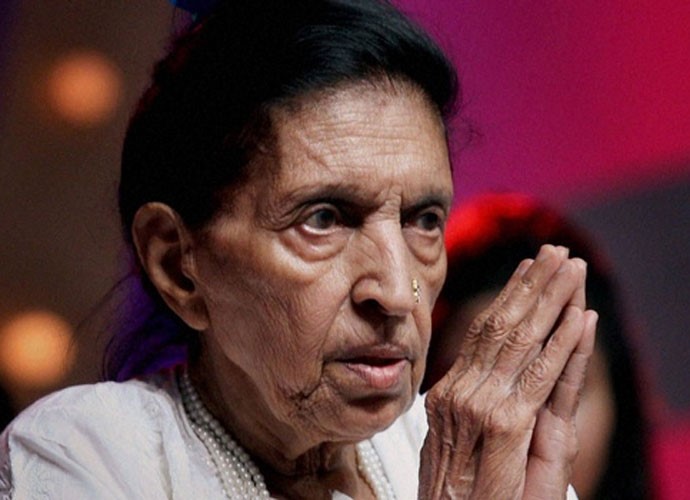Mubarak Begum, who lived on the fringes of the Hindi film music industry, died in penury.
When I met her in her one-room flat in Mumbai's suburb Jogeshwari many years back, she was lying on a cot, clearly unwell. The flat was brimming with relatives including a daughter struck by Parkinson's.
She got up and sat on the cot, arthritis-ridden legs dangling down, and spoke to me at length about her journey in the playback industry.
She then delighted me with snippets of her well-known songs. Her voice was frail and tremulous. Yet, at her old age, and without any riyaaz, she was still in swar.
I presented her with a small financial tribute and came back greatly saddened. This was a serious talent that just withered away because of lack of opportunity on account of cut-throat competition that our film industry is known for.
Though she rendered some immortal songs, her oeuvre was defined largely by mujra numbers and B-grade film songs. One of the best devotional songs that I have heard is ‘Devta Tum Ho Mera Sahara’ from Kamal Amrohi's Daera released in 1953.

Mubarak Begum was very bitter with the way her life turned out to be.
Mubarak's mellifluous voice takes it to a different level. Though it was technically a duet, Mohammed Rafi only played a supporting role though by then he was a big name.
In fact, Mubarak is on record acknowledging Rafi's respect for his co-singers, so much so that he lowered his pitch in this song when Mubarak couldn't match his original pitch.
Jamal Sen, the music director, used Mubarak in the other songs from this film as well.
Her selection to sing playback in Daera was serendipitous. With other singers not available, Mubarak was taken to meet Kamal Amrohi who was busy with a recording and asked his representative to take a decision. Her voice was approved.
The film unfortunately was not a success and didn't do much for her career.
Who can forget Mubarak in the evergreen duet with Rafi –
‘Mujhko Apne Gale Laga Lo’ from Humrahi (1963)? It is one of the most romantic songs I have heard.
But Mubarak may never have sung this iconic song when it was released. She recorded the song as a filler, to be dubbed by Lata Mangeshkar later. Music director Jaikishan waited till the last minute for Lata to show up, but she never did. So, Mubarak was retained.
Rafi also played a part in persuading Jaikishan to retain Mubarak to encourage her.
Mubarak sang a line from the song for me.
In the film Teesri Kasam (1966), people remember Waheeda Rahman's famous dance numbers, sung by Lata and Asha Bhosle.
But the real nautanki style ‘Hai Mohabbat Bahut’ was sung by Mubarak for Waheeda. The typical nautanki-style singing and Waheeda's unrestrained dancing made this a memorable song.
Similarly, ‘Be-murrawat, Be-wafa, Begana-e-dil Aap Hain’ from the 1964 film Sushila, sung under the banner of C Arjun, became very popular. Mubarak sang a line from this song too.
She even sang a few songs for Pakistani films during her visit to Pakistan in the late 1950s. These included songs in Raaz and Bada Aadmi and a duet with the Pakistani great Ahmed Rushdi.
She sang an incredibly beautiful duet with Talat Mahmood – ‘Kuch Ajnabi Se Aap Hain Kuch Ajnabi Se Hum’ from Shagun (1964) under Khayyam.
‘Woh Na Ayenge Palat Kar Unhe Lakh Hum Bulayen’ from Devdas (1955), composed by SD Burman, occupies an iconic place in Mubarak's career. The other mujra song that became a big hit was from Madhumati (1958), composed by Salil Chaudhury – ‘Hum Haal-e-dil Sunayenge’.
But one song that stood head and shoulders above her entire repertoire and defined her was ‘Kabhi Tanhaiyon Mein Yun Hamari Yaad Ayegi’ from Hamari Yaad Ayegi (1961), with music by Snehal Bhatkar.
The song became an anthem of lovesick souls.
Here again lady luck played a huge role. Lata was to record this song but was busy with a V Shantaram recording. Kedar Sharma, the well-known director, could not accept this unprofessional attitude and replaced Lata with Mubarak.
She was also a prolific singer of private ghazals and naats.
Mubarak was very bitter with the way her life turned out to be. The sadness on what could have been informed her every word, her every gesture when she spoke to me.
She deserved much more... much, much more. She has moved on to a better place.


Comments